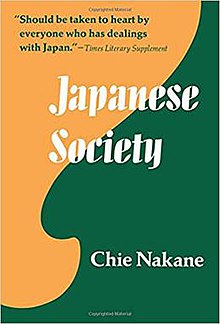Japanese Society (book)
This article relies largely or entirely on a single source. (February 2016) |
 | |
| Author | Nakane Chie |
|---|---|
| Country | Japan |
| Language | English |
| Genre | Sociology, Anthropology |
| Publisher | Pelican |
Publication date | 1970 |
| Media type | Print (Paperback) |
| Pages | 162 |
| ISBN | 978-0-14-021682-0 |
| OCLC | 1023276 |
| 309.1/52/04 | |
| LC Class | HN723 .N31513 1973 |
Japanese Society (1970) is an analysis of the structure of Japanese society, written by Nakane Chie. The main theme of the book is the working of what Nakane calls "the vertical principle" in Japanese society, which is a series of social relations between two individuals, one of whom is senior and one of whom is junior.
Nakane also formulates the criteria of 'attribute' and 'frame' to illuminate that way that groups are formed in Japan, and to compare Japan with other countries. Her thesis is that 'frame', which is circumstantial and may be "a locality, an institution or a particular relationship which binds a set of individuals into one group,[1] is more important that 'attribute', "which may be acquired not only by birth but by achievement", examples of which include "a definite descent group or caste".[2] This situation is contrasted with India.
The book is broken down into four chapters:
- Criteria of Group Formation
- The Internal Structure of the Group
- The Overall Structure of the Society
- Characteristics and Value Orientation of Japanese Man
See also[]
- Ingroup
- Social psychology
Notes[]
- 1970 non-fiction books
- Japanese non-fiction books
- Books about Japan
- Sociology books